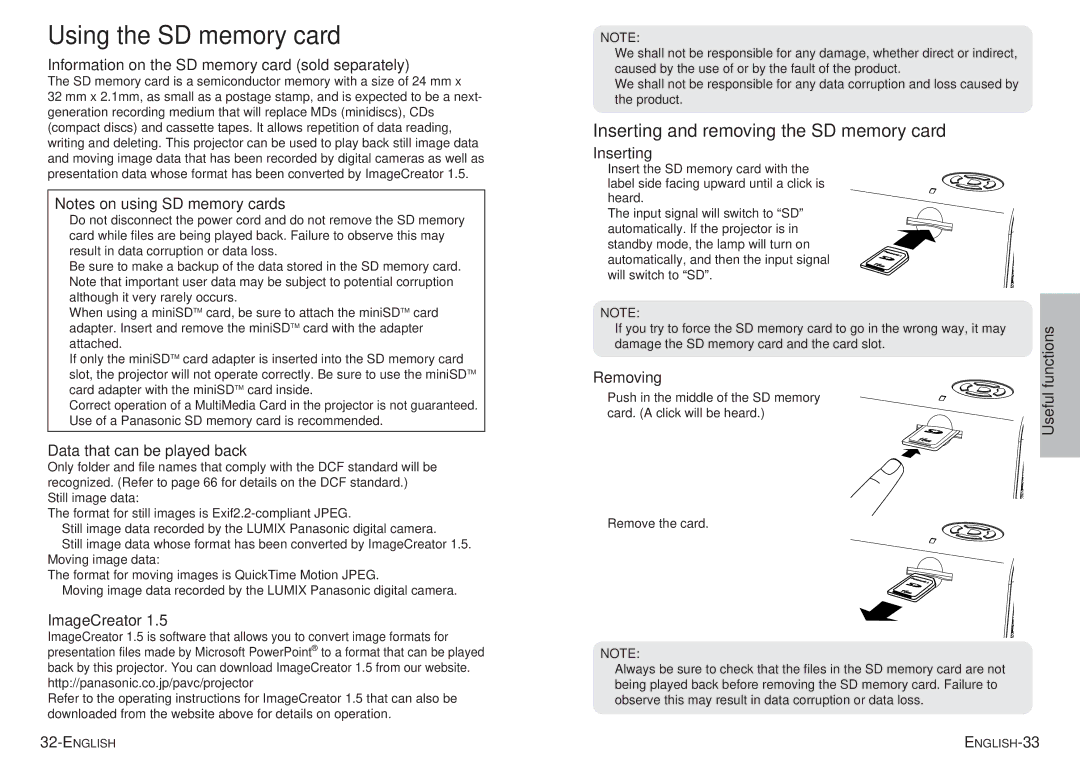
Using the SD memory card
Information on the SD memory card (sold separately)
The SD memory card is a semiconductor memory with a size of 24 mm x
32 mm x 2.1mm, as small as a postage stamp, and is expected to be a next- generation recording medium that will replace MDs (minidiscs), CDs (compact discs) and cassette tapes. It allows repetition of data reading, writing and deleting. This projector can be used to play back still image data and moving image data that has been recorded by digital cameras as well as presentation data whose format has been converted by ImageCreator 1.5.
Notes on using SD memory cards
BDo not disconnect the power cord and do not remove the SD memory card while files are being played back. Failure to observe this may result in data corruption or data loss.
BBe sure to make a backup of the data stored in the SD memory card. Note that important user data may be subject to potential corruption although it very rarely occurs.
BWhen using a miniSDTM card, be sure to attach the miniSDTM card adapter. Insert and remove the miniSDTM card with the adapter attached.
BIf only the miniSDTM card adapter is inserted into the SD memory card slot, the projector will not operate correctly. Be sure to use the miniSDTM card adapter with the miniSDTM card inside.
BCorrect operation of a MultiMedia Card in the projector is not guaranteed.
BUse of a Panasonic SD memory card is recommended.
Data that can be played back
Only folder and file names that comply with the DCF standard will be recognized. (Refer to page 66 for details on the DCF standard.)
Still image data:
The format for still images is
BStill image data recorded by the LUMIX Panasonic digital camera.
BStill image data whose format has been converted by ImageCreator 1.5.
Moving image data:
The format for moving images is QuickTime Motion JPEG.
BMoving image data recorded by the LUMIX Panasonic digital camera.
ImageCreator 1.5
ImageCreator 1.5 is software that allows you to convert image formats for presentation files made by Microsoft PowerPoint® to a format that can be played back by this projector. You can download ImageCreator 1.5 from our website. http://panasonic.co.jp/pavc/projector
Refer to the operating instructions for ImageCreator 1.5 that can also be downloaded from the website above for details on operation.
NOTE:
BWe shall not be responsible for any damage, whether direct or indirect, caused by the use of or by the fault of the product.
BWe shall not be responsible for any data corruption and loss caused by the product.
Inserting and removing the SD memory card
Inserting
#Insert the SD memory card with the
label side facing upward until a click is heard.
BThe input signal will switch to “SD”
automatically. If the projector is in standby mode, the lamp will turn on automatically, and then the input signal will switch to “SD”.
NOTE:
BIf you try to force the SD memory card to go in the wrong way, it may damage the SD memory card and the card slot.
Removing
#Push in the middle of the SD memory card. (A click will be heard.)
$Remove the card.
NOTE:
BAlways be sure to check that the files in the SD memory card are not being played back before removing the SD memory card. Failure to observe this may result in data corruption or data loss.
Useful functions
